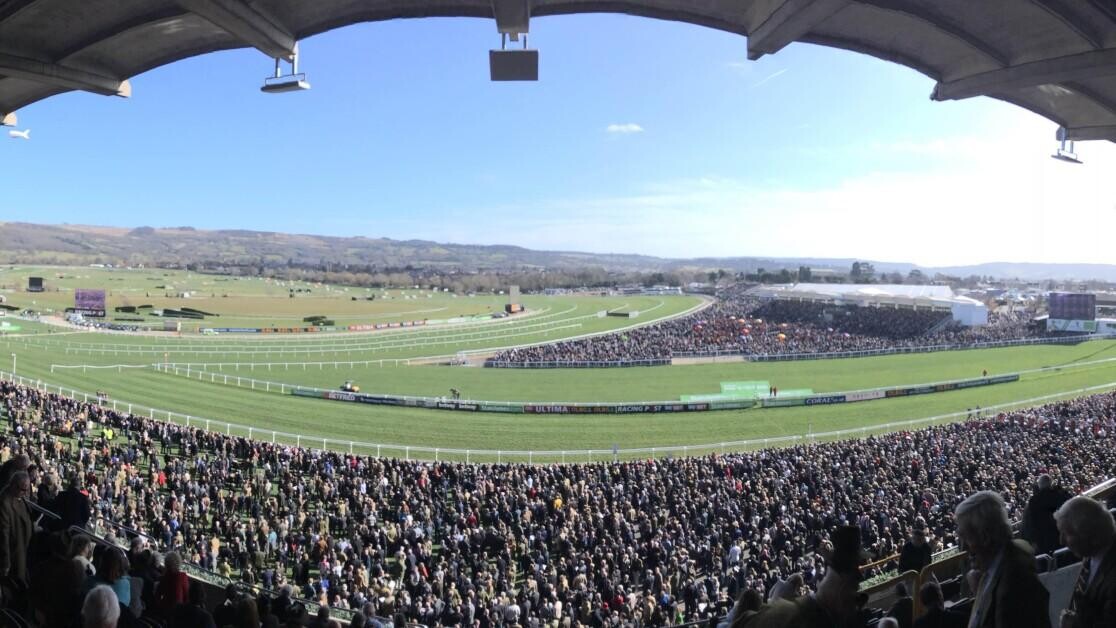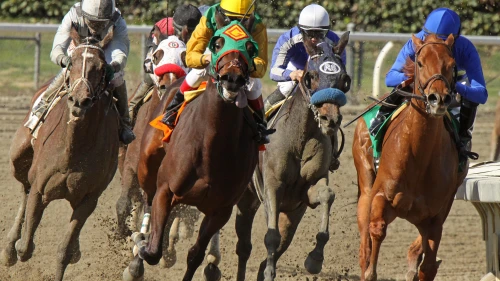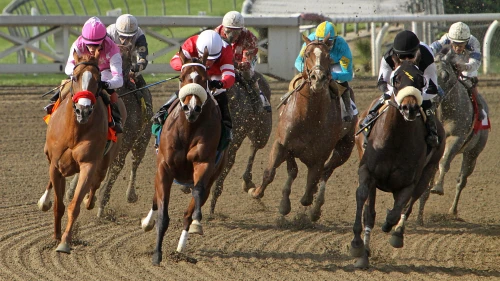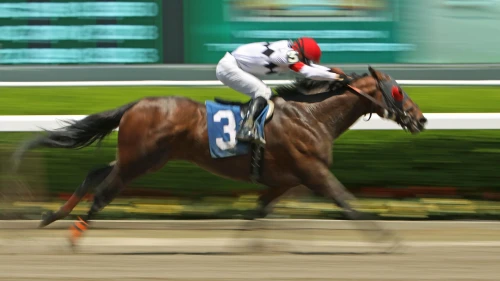
Editor-In-Chief with 20 years experience covering the betting angles to breaking news stories. Daily slots player, Portsmouth fan and League Snooker Player

Professor Mark Bowen, a leader in his field with over 20 years of experience in equine medicine and behaviour, reveals how the return of large crowds could influence some horses, what to look out for in a horse before a race, and how grooms and jockeys will play a bigger role than ever this year in a horse’s preparation.
The return of spectators at Cheltenham means the traditionally passionate crowd will be back in place and the Festival will be much greater for it, but the return of 80,000 Guinness-soaked racing fans presents a new challenge for some trainers. There will be many horses at Cheltenham this year that will have only raced in front of a handful of spectators at quiet tracks, making the Festival a very unfamiliar environment for them.
Horses with big crowd experience could have an advantage
There are some horses who don’t have a level of understanding that all these people have to come watch them to win a race, but clearly some horses thrive in that environment. Horses are all individuals and some horses seem to thrive in an environment where they've got lots of noise around them, even if they've not been exposed to it before. So you'll get some horses, and often their performance is going to be better on a race day than it is ever going to have been during training, that's partly because they're being ridden to win rather than to train. There is an effect of competition that does push them to the limits of their performance. Maybe it will advantage some of those horses that have raced before.
The large crowds are going to have the biggest impact on horses at the beginning and the end of a race. There are going to be noises that are going to be unfamiliar and cause some mild anxiety as they arrive at an unfamiliar environment and stable. The time that horses are most exposed to the public is the parade ring and on the way to the start and then, if they've had a good day, in the winners' enclosure, those are the key points where we should be thinking about how the return of spectators is going to impact on the horses.
During the race itself, horses are the ultimate athlete, they have evolved as a herd species and they are racing each other out of a natural instinct to be in front and therefore at that point, the spectators have the least impact on them. Coming up the hill, they're doing 25mph, so the noise that they register is going to be very limited and the noise will come to them at the end after the racing has finished and that's when they'll be exposed to that noise. The spectators play a very important role in terms of the horses being prepared for a race and their attitudes to that race.

When choosing a winner from the parade ring, avoid horses that waste energy and look for the calmest runner when they go to post
Watching the horses in the parade ring is really important. We know that the horses that are winners tend to be the more relaxed horses in the parade ring, but it's not a hard and fast rule. Horses that are prancing around and battling their grooms could still go out and surprise us. It's easier to pick losers often than it is to pick winners by those that are looking distressed and exerting a lot of energy. What you want to see are horses that are walking around and being attentive and aware of their environment, they're not fighting with their grooms and they don't try to bolt and run off as soon as their jockey mounts. When they're on their way to post, you want them to be under control and not wasting energy, so everything is calm and focused, they're going to be aware and engaged in their environment. Their ears are going to be moving position all of the time to focus on noises.
There was a study done several years ago in Melbourne in two and three-year-olds and they showed that horses showing certain behaviours were more likely to lose, so it can have an impact. If they are sweating a lot it suggests their exerting additional energy which might be the edge to suggest they can't hold out until the end, but equally, it might be a horse with spare energy. Cheltenham, particularly the Gold Cup, is a tremendous endurance event and you don't want them to be wasting any energy beforehand by fighting with their grooms, pulling at their jockey on the way to the start, all of these are wasted energy and it won't be available when they need it coming up the hill.
Watching the horses go out to the start is a much more useful indicator than seeing them in the parade ring. Watching them go and see how relaxed they are with the jockey on board is probably what you should be doing [before visiting the bookmakers]. You're looking for a horse with their head nice and relaxed and extended, they're not fighting the jockey the whole time, the jockey is not having to hold them back completely - though obviously, you don't want a horse that looks like it has no energy. But the moment the race starts and there are others around them, horses will always surprise us.
For spectators, the time to be careful is around the parade ring. Should the weather not hold out, be careful when putting umbrellas up and jackets that are flapping. If you see a horse that is slightly nervous, just move away slightly and give them space. If you have an umbrella, put it up quickly and don't let go of them.

Jockeys and grooms have a bigger job than ever before in managing horses around the return of large crowds
The one thing that we know about horse behaviour is the relationship between a horse and their handlers, be that their groom or jockeys, is really important. They are the ones that can make what would otherwise be stressful situations much less stressful. Horses build up relationships, so having consistency with the groom that looks after them during the week being the one that takes them racing is the one that takes them into the parade ring. It's all about certainty. That personal effect will offset a lot of the issues.
I think they're [grooms] going to be really important for being that reassuring person that is going to help the horses accommodate this return of crowds at racing. The grooms are going to play an ever-important role. That role will have started months ago in terms of the relationship that the grooms develop with their horses. The closeness of that relationship becomes so important and they are so stretched at the moment in terms of workload.
Jockeys are immensely skilled at developing trust with their horses, the best jockeys can develop that trust in a matter of moments and they have an innate link that means that those horses will then do anything for them, you just need to look at the modern pentathlon and how that can go wrong.
Jockeys are experts at this and it's all about their very first approach to the horse, it's about approaching the horse in a way that encourages trust and confidence that this person is not going to do them any harm, that they can be relied upon, with simple body language about how you approach the horse the first time you're going to get on it and how you treat that horse when you're on it.

Horses accustomed to noise will settle best at Cheltenham, where a lot of new sounds will be present
The key thing is to ensure a good relationship between horse and groom and horse and jockey, as well as getting horses as accustomed as possible to the noises that they are going to experience. They will have seen tractors and other farm machinery on the gallops, so they're going to be used to strange noises, but there's always the unpredictable on race day that you can never look out for.
There's going to be helicopters landing, probably the noise of the helicopter is not a concern, horses tend to watch flying objects, birds or plans or helicopters, so they have a slightly surprised look when they see these objects coming to the ground. As long as there's a good relationship in place, the horses realise that there's no harm going to come to them. Their welfare is always the priority for the trainers and the grooms, so they don't need to be scared of the uncertain. They are flight animals, they are bred and evolved to escape from lions, so there will always be that moment where something could spook them and they will bolt and run off, having a relationship of trust where a jockey can bring them back to earth is important. The most important thing anyone can do is make sure there is a good relationship between horse and groom and jockey.
Most of these horses will have raced before and had exposure to crowds, small crowds, nothing is like Cheltenham and nothing is quite the same. There's always going to be that slight degree of uncertainty for the horses, but they do cope with it really well. Horses are amazing animals and they cope really well with what you think might scare them and the things that do scare them could be things like a plastic bag rather than anything else.
Huge thanks to Professor Mark Bowen for sharing his insights on the impact of the crowds at the Cheltenham Festival, exclusively with OLBG. We hope this helps you with your Cheltenham bets this year, don't forget that you can get horse racing tips for free at OLBG. If you fancy yourself as a tipster there is a £1500 free to enter Cheltenham tipster competition with a £500 first prize. Now is a good time of year to open a new betting account, check out the latest cheltenham offers and free bets available.



